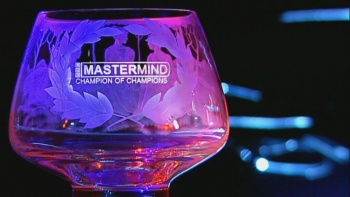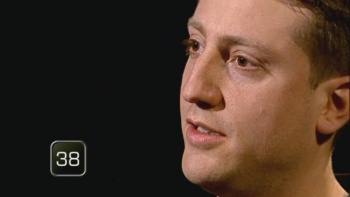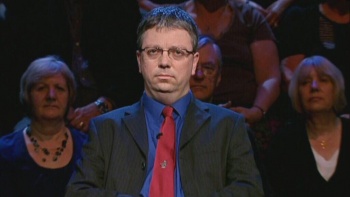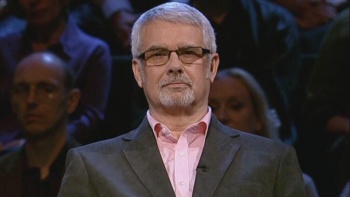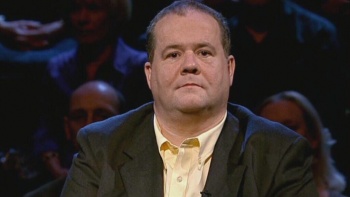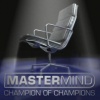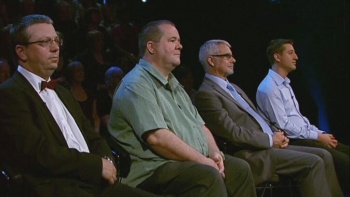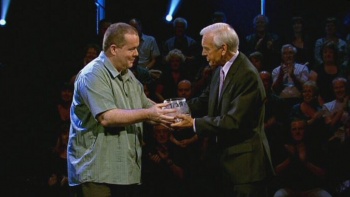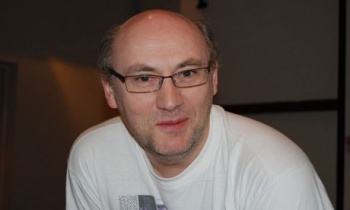Weaver's Week 2010-08-08
Last week | Weaver's Week Index | Next week
Contents |
Mastermind Championship of Champions
Sixteen of the greatest champions have returned for this one-week shootout tournament, to find the ultimate Mastermind champion. There haven't been articles in the press speculating about who would be invited, we're just happy to bask in the greatness unfolding over the course of the week.
Heat 1
Geoff Thomas begins this series by reminiscing about the mystery guest who presented his trophy in 2006: Magnus Magnusson, still the best host of this contest. His specialist subject is Donald Bradman (1908-2001). Bradman is generally held to be the greatest cricketer of the 20th century. He was active in Test matches from 1928 to 1948, where he averaged 99.94 runs between dismissals, including one knock of 334 against England. The contender is a little rusty and gets his first question wrong, but that's all the error: 16 (0).
Jeremy Bradbrooke says how his doctor thought that he had won the snooker; his win was in 1987, so it's almost an understandable error. The specialist subject – as in his final – is The Crimean War (1853-6). This was a series of battles between Russia and the Ottoman Empire for control of a peninsula in what's now Ukraine. The Ottomans were able to call on their allies France and the UK. The proximate cause of the conflict was a set of keys for the Church of the Nativity in Bethlehem, and it ended after slightly more than two years with Russia suing for peace. It's pleasing to see that the questions are in approximate chronological order, ending with the concluding Treaty of Paris (1856). The total: 16 (1).
Jesse Honey is the reigning champion, and he's got National Flags of the World. The Hitch-Hiker's Guide to the Galaxy warns "It is worth checking whether the design of your towel happens to match one of the following flags before you visit the place." We did not know that Lichtenstein added its crown to avoid confusion with Haiti's flag, or that it was possible to get this many points in a round. Mr. Honey's total is a remarkable, a surprise, a record 23 (TWENTY-THREE) points. And no passes.
"Wow" says our host. Stephen Allen – the 1991 winner – gives the impression that he doesn't quite believe he can win from here. In his filmed insert – everyone gets one – he remembers that he was praised by his union boss for helping to show that actors are not all stupid. In our experience, none of them are. The specialist subject is Edward Thomas (1878-1917). Born in Lambeth to Welsh parents, he's been adopted by the principality as their war poet. His poetry career was short – barely two years before he was killed at Arras – but prolific. Amongst his 140 works are "Adelstop" and "In Memoriam". By any normal standards, 16 (3) would be a great score. Not tonight.
We're still in shock from that display of flag-waving. Geoff Thomas advances his score to 28 (0), and he's still never passed a single question. Jeremy Bradbrooke knows which sign of the zodiac is represented by a goat, the uses of Obsidian, and where to find Prince Edward Island. His final score is 25 (2).
Stephen Allen knows his unicameral parliamentary systems, and where to find the Peak District national park. In the Peak District, we would have thought. He also manages to confuse Tracey Emin with Lady Gaga, a distinction that isn't as large as either would like us to believe. It's a really good round, the final score is 29 (3).
But tonight already looks to be Jesse Honey's night: seven to win, there's no space for losers. He knows who Herman von Rompuy is, a man who is hardly a household name in his own household. He knows about Einsteinium, and the location of television show "The Wire". This man knows a lot, and finishes on 38. THIRTY EIGHT!!! And (2) passes.
Heat 2
Well, that's got things off to a cracking start. As we'll see, the draw has thrown up a contest that might actually settle at least one television argument.
Gavin Fuller was the champion in 1993, and he's picked a small subject. Mike Oldfield (b 1953) is a multi-instrumentalist musician and composer. His best-known work is Tubular Bells (1972), the first release on Virgin Records and part of the answer to that great modern conundrum: why Richard Branson? Oldfield's subsequent works include Tubular Bells II, Tubular Bells III, The Millennium Bell, and Platinum (famous in these parts as the theme to First Class The Video Quiz). Well, that's what we know – Mr. Fuller remembers "In Dulce Jubilo" and the Trevor Horn connection, and finishes on a perfect score of 19 (0).
Elizabeth Horrocks was the winner in 1974, and it was around this time that the papers said "If a man doesn't win soon, we'll have to change the show's name to Mistressmind". She remarks that facing Magnus was less daunting than a class of fourth formers. Her specialist subject is The Arthurian Legend (from the 6th century). This tells of a hero-king who would unite the whole nation of England against its enemies. He had the support of Knights of the Round Table, and was guided by the prophecies of Merlin. Arthur was recognised as the rightwise king of all England after pulling the sword Excalibur from the throne, thus giving Rick Wakeman a rather pleasing tune. It's been a year or two, and the contender finishes on 13 (3).
Who's next? It's only that bloke from The Chase! Shaun Wallace won in 2004, taking three football-related subjects. Not tonight, he's taking Frasier (1993-2004), a comedy series based on the life of Dr. Frasier Crane, who works as a psychiatrist on a speech radio station. The show relies on complicated and unlikely plots, such as the ongoing non-romance between Frasier and his physiotherapist Daphne Moon, or the hilarious confusion when brother Niles Crane is appointed minister for education in the British government. As seems to be the tradition, the questions are mostly about plot minutiae, and the round ends on 17 (0).
Which brings us to Chris Hughes, who bills himself as "Retired Train Driver & Egghead", because of his famous job driving trains. For the third time, he's taking British Steam Locomotives 1900-1968. Invented by Richard Trevithick, and popularised by George Stephenson, the steam locomotive was the main means of propulsion on British railways until replaced by diesel engines after the second world war. They were prone to breakdown, emitted clouds of soot and smelled a bit, but so did the steam trains. The contender knows his trains, we're left standing at the station wondering at the phenomenal knowledge, and cheering a 15 (0) score.
So, Elizabeth Horrocks kicks us off, she knows where in France to find truffles, and what a defibrillator does, but she's often off by a trivial but crucial point – saying Nicholas I when it's Nicholas II, that kind of minor detail. ending on 21 (8).
Mr. Hughes rather gets bogged down in some errors early in his round, but he's helped to soar away thanks to knowledge of Peter Viggars and his Famous Floating Duck House. The final score is 25 (3), which doesn't feel like a winning performance this time.
Mr. Wallace has something to tilt at, but also gets caught in some incorrect answers early in his round. He gets some dribs and drabs right, but there appear to be more errors. Finally, the engine lights only for time to expire, and the final is 22 (0).
Can no-one beat the Egghead? It's Mr. Fuller's game to lose, he needs just seven to win, and kicks off with that old chestnut "which type of bridge is Tower Bridge?" He gets one question wrong, and realises his error even as he's saying it, which is the sign of someone who knows their onions. His winning score is 28 (2).
Heat 3
The Revd Dr Richard Sturch applied for Mastermind's 1996 series to prove that the clergy weren't all stick-in-the-muds, and won through an all-clergy heat. His specialist subject here is King Michael of Romania (b 1921). The son of King Carol II and Helen, Michael ascended the throne at age 5, was deposed three years later, restored after an eleven-year gap, and driven into exile when the Communists took over after the war. It's a careful round, every answers is well considered, but no less devastating in its accuracy. A score of 15 (1) indicates this contender is one to be reckoned with.
Andy Page was the winner in 2003, and he's answering questions on Arrested Development (2003-06). This is a US sitcom, the plot of which centres on a wealthy and largely unsympathetic family, who find themselves scrambling and scheming to stay afloat after the patriarch is imprisoned for fraud. Though never highly-rated, the show won six Emmys and a Golden Globe. Shown in the UK on BBC2 and BBC4, the programme is now off air and only available on DVD. As ever, most of the round is spent on guest stars and plot minutiae, which we always think is a bit of a missed opportunity. Not that we can describe Mr. Page's round in these terms, he finishes on 15 (5).
Nancy Dickmann is up next, the winner in 2009 and her revision has been helped by the presence of a second newborn child – the first coincided with her heat win. The specialist subject is Roald Amundsen (1872-1928) was a Norwegian explorer of polar regions. He commanded the first vessel through the North West Passage between Canada and Russia, and was the leader of the first party to reach the South Pole. He died in an air crash in 1928. It's always pleasing to note that the questions cover the subject's life from birth to finish, and even more pleasing to note the score, 16 (0).
The 1990 champion David Edwards has won just about everything since – Who Wants to be a Millionaire, Masterteam, and makes his debut on Round Britain Quiz next week. His subject tonight is the Mystery of Rennes-le-Chateau (since 1950). Rennes-le-Chateau is a small town in the Languedoc, in southern France. Bérenger Saunière, a priest in the late 19th century, is said to have acquired and spent large sums of money, and no-one quite knows how. Mythmakers have embellished these tales, and they've turned up in Foucault's Pendulum and The Da Vinci Code. The round is another quality one, ending on 16 (0).
Rev. Dr. Sturch knows where to find Bailey's Beads, and where to find Burundi on the map (readers may need to blow the cake crumbs away). Indeed, like his specialist round, this session lacks a little in speed, but is entirely decisive and almost always right. Sadly, a run of passes late in the round costs him, and 26 (6) doesn't feel like a winning score.
Mr. Page is just the right age to remember Michael Thomas's Wondergoal, the patron saint of Glasgow, and the scientific name of heavy water. There were a lot of passes earlier, so it's no real damage to take more now, and the final score is 27 (8).
Nancy Dickmann has never suffered on UK trivia, and – just as in her final – is ready to pounce as soon as John Humphrys has finished his questions. But after a confident start, something goes wrong, and there's about thirty seconds where the score barely ticks over. There's just enough time to pass the finish line, ending on 27 (2).
Mr. Edwards needs thirteen to win, twelve and no passes may suffice. He suffers a moment of failure when forgetting which country gave Roe v Wade, but remembers where to find the Jodrell Bank telescope and the Gaelic name for Scotland. That last one is the winning moment: it increases his score to 28 (2), and that is enough for a victory.
Heat 4
Three quiz giants are into the final, another will join them tonight.
First up is David Clark, champion in 2008, when he proved that grannies really can tell the future. He's been researching The Bayeux Embroidery (c. 1076), a pictoral record of William of Normandy's famous away victory against Harold of England ten years earlier. It's believed to have been commissioned by Bishop Odo, and was certainly hung in Bayeux Cathedral for the education of the illiterate masses. On 1st July, according to one of the many correct answers given in this round: there's one error, and one pass, and 17 correct answers.
The earliest champion to be competing this week is Patricia Owen, champion in the second series in 1973. "Why are women always winning Mastermind?" asked The Times after this result; her husband was asked if he minded having a clever wife, to the response "I would very much mind if she were not." Hurrah! Subject here is the Operas of Benjamin Britten (1913-76). He was an English composer, whose works include Peter Grimes, Seven Sonnets for Michaelangelo, The War Requiem, and the music for Night Train. His memory lives on in the Aldeburgh Festival, held each year in Suffolk. While the contender may not have the speed to win, she's clearly enjoying her time in the chair, and that's infectious. 11 (3), and we've the hugest of smiles.
Leslie Grout was champion in 1981, the year after Fred Housego, and he was in all the papers the morning after transmission. Not that the children in his school class noticed. He's taking Burial Grounds of London, as in places where dead people were buried in London. What were you expecting from this round, a map of the sun? Highgate Cemetery is perhaps the best known of these places, but there are many other grounds, each seemingly with a million tales. A sterling performance ends on 15 (0).
Pat Gibson is our final contender, the champion here in 2005, since when he's run the house on Millionaire, been appointed an Egghead, and won Brain of Britain. Pixar Animated Films (est. 1986) began life as the computer graphics branch of Lucasfilm, and broke ground with its work on 1991 films "Beauty and the Beast" and "Terminator 2: He Did Say He'd Be Back". Other works include A Bug's Life, Cars and the Toy Story trilogy, and all of these works appear in the round, as do many others. There's an unusual error in there, and the round finishes on an ominous 16 (0).
Patricia Owen returns to the chair, and is asked about that volcano. It's almost as if Mr. Humphrys never quite managed to pronounce Eyjafjallajoekull. It really is very simple, but we don't have the time to explain it now. We're after the man who invented Kodak photography, and the Greek character who released the ills into the world. 19 (8) is the final score, and it's been a pleasure.
Now, Leslie Grout needs to set a mark, and kicks off with a nectarine. Wagner popularised the leitmotif, and the plot of Open All Hours fall, but there's a long period where the contender doesn't advance his score at all. That rather sets Mr. Grout back a little, and he ends on 23 (0).
Pat Gibson has only just begun, and he's chuffed. Oh, one of his answers is "chuff", which makes a bit more sense. "Lusophone" relates to Portuguese, the settings of Blackadder, the spires of Lichfield cathedral, Marshall McLuhan, all fall easily to this contender. He finishes on 30 (0).
On his exceedingly good Life After Mastermind blog, David Clark says that 20 points is a very good score, and 30 rarely loses. There are about half-a-dozen correct answers while we're writing that sentence. Already behind in the pass count, the contender needs to reach 31 to win, and can afford to pass rather than guess. It's the right tactic, and the correct answers pile up – emetics, Taoism, Neville Chamberlain. But there's been just the one error too many – the final score is 30 (4).
Which means that tomorrow's final will be between two Millionaire winners, a one-man archivist, and one record-holder. We. Cannot. Wait.
But we have to, so here's something to build the tension.
University Challenge
Round 1, Heat 5: York v Royal College of Music
The show begins with a bow and arrow, and it's picked up by York. It's quaintly described as a "plate-glass" university, which sprang into being in 1963. It's famed for its lake and wildfowl; alumni include Labour party deputy leader Harriet Harman, BBC director-general Greg Duck, and the Hitchhikers team from the last series of Only Connect.
Within moments, the Royal College of Music (RCM hereafter, it's good enough for Roger Tilling) pull back with the biography of George Orwell. It's a college of music, and has been doing that since 1882. The main building is opposite the Royal Albert Hall, and former students include Joan Sutherland, Gustav Holst, and Benjamin Britten.
There are a couple of dropped starters already, which doesn't bode well for the rest of the show. York know about the Commonwealth's new members, and pick up the first visual round – famous pop stars as though they're made out of plastic blocks. York's lead is 65-15, but they're not running away with it.
RCM are asked to name a Nobel-winning physicist who had some rays named after him. "Gamma" is the offer, which isn't entirely without merit – saying "pass" is certainly going to be wrong. We did not know that popcorn was supposed to contain the spirits of dead people. RCM get the Little Billy Shakespeare bonuses, they're asking who says certain well-known quotations – it's more difficult than it seems.
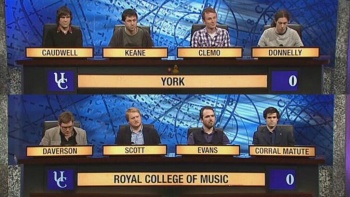 York (Chris Cauldwell, Ben Keane, Andrew Clemo, Simon Donnelly) and the RCM (Teven Daverson, Michael Scott, Sam Evans, Al Corral Matute).
York (Chris Cauldwell, Ben Keane, Andrew Clemo, Simon Donnelly) and the RCM (Teven Daverson, Michael Scott, Sam Evans, Al Corral Matute).
The scores are tied, but York manage to get the next starter and re-establish their advantage. Ah, "red herring" from something to confuse foxhunters? It fits. York do well on questions about Hudson's Bay, but there's no surprise as RCM pick up the audio round – it's different performers of a popular song. How can anyone not recognise Tom Jones and Dusty Springfield in what feels like thirty seconds? York's lead is back up to 100-75. There's a question about chemical balancing that makes about as much sense as an episode of Numberwang, then we get Interruption of the Week:
- Q: With around 22,000 accepted species, the largest family of flowering plants...
- RCM, Sam Evans: Orchid
Hats off, sir! York impress us by knowledge of the surviving member of Magellan's crew, as does their knowledge of guards. York also get the second visual round, on paintings of revolutions and the year they took place. Their lead is 165-85.
Have we finally found a chink in the armour of York? We thought that they might struggle on Scottish kings, but no, the side retains its remarkable record of answering at least two of each set of bonuses correctly. For a short while, we thought no-one would know anything about Telford; York's armour is finally penetrated by words in the NATO alphabet taken out of context.
The game is long won, and there's almost no chance that the RCM will record the 155 they need to challenge on the repechage board. Finnish and Estonian; Romanian and Moldovan; Latvian and Lithuanian. All are similar languages, and we would rather have hoped that this would be clear by a cursory examination of the respective Eurovision Song Contest entries. Nagorno-Karabakh is, of course, an enclave of Azerbaijan. York don't get to answer that, they've won by 245-105.
Andrew Clemo played a captain's innings for York, securing nine starters. The side were correct in a remarkable 25/38 starters with two missignals. Sam Evans was a valiant buzzer for RCM, he got seven starters, but the side had a woeful bonus conversion rate, just 6/24, and with one missignal. The overall accuracy thus suffered, 52/88.
Next week: Newnham Cambridge v Southampton
Mastermind Championship Of Champions Final
So it's come to this. Almost forty years of questioning, four presenters, four broadcast channels, and now only four contenders remain. Whoever wins tonight will be crowned the Mastermind Champion of Champions 2010, and win the greatest honour bestowed in the quizzing world. And a glass bowl.
Gavin Fuller, the 1993 champion, returns now. His subject for the ultimate final is HMS Warrior (built 1860). The world's first ironclad warship was launched in London, having been commissioned to strike fear into Napoleon III and indicate that an invasion of Blighty wouldn't work. The Warrior never saw active service, and is now on display in Portsmouth. In this round, we learn that the ship collided with the Royal Oak (another ship, not a tree 60 miles inland), had a launch delayed by ice, and had funnels that could go down as well as up. And speaking of things going up, Mr. Fuller (and his natty bow tie) scores 17 points and no passes.
Pat Gibson, winner in 2005, has taken a large subject: Great Mathematicians. Ada Lovelace! Mary Somerville! Florence Nightingale! Count von Count! All of them mathematicians, all of them greats, none of them included in this round. The question subjects include Fermat's Last Theorem, non-Euclidean geometry, a 17-sided figure, e, Archimedes, Laplace's political career (he was in the cabinet for twice as long as David Laws), and Robert Bunsen. The round finishes on 16 (0).
David Edwards won in 1990, and tonight answers questions on Count Rumford (1753-1814). Exiled from Massachusetts for supporting King and Country in the insurgency, Benjamin Thompson became a Count of the Holy Roman Empire, devised a better fireplace, and helped to found the Royal Institution, of Christmas Lecture fame. He also tried to govern the Georgians, but found they weren't going to take any lectures from anyone, whatever time of year. It's another cracking round, finishing on 16 (0).
Jesse Honey was crowned champion barely three months ago, and has been swotting up on Westminster Cathedral. The present building was built between 1895 and 1903, to a design by John Francis Bentley. The building boasts well over 120 different types of marble. The round tells us that there are a phoenix and a peacock over the door, that there's a memorial made out of nails, and that all of these contenders would benefit from questions being less wordy. Mr. Honey finds time for one pass, and still scores 17 points.
Gosh, that's tight! Now, there's a change for the general knowledge round: it'll last 150 seconds, two-and-a-half minutes. For a special like this, it's a fair and worthy alteration, though we have to see if it will alter the play in the annual contest.
That's in the future. Mr. Gibson kicks us off tonight, and knows why Barnard's Star got its name, from the word "star". No, Mr. Thermos didn't invent the vacuum flask, it was Mr. Dewer. There's a namecheck for Stanley Kubrick, and for Mother Shipton, and a plug for Junior Apprentice. There's even a question about a composer, and Mr. Gibson knows his Handel. And a lot of other things – his score, a record for this four-and-a-half minute format (not least because he's the first to attempt it), is 36 (0).
From one millionaire to another, Mr. Edwards needs twenty-one to take the lead. He starts off by guessing a colour, and guessing wrongly, but this isn't the end. There's Barra's runway, David Attenborough, the helix, students of wine (shurely they're hicologists after a hard day's work). Currencies of Hungary, the uses of a hydrometer, Cassals and Umbria, but Mr. Edwards had a few errors in his round, and ends at 32 (0).
Mr. Fuller starts off with a patriarch, a gherkin, Carmen, and Essex. There's a joke in there, somewhere. Such frippery won't stop this quizzing machine, but Humphrys giving alternative answers will eat into the contender's time. After passing once, Mr. Fuller knows that his best bet is to pass rather than guess – Jim Callaghan, the footballer Nani, the "Hollywood" sign, karma, tartrazine all help to run up the score. But Mr. Fuller has missed too much, finishing on 32 (2).
Mr. Honey therefore needs twenty points to win, and there won't be a tie-break. His first questions are about southpaw boxers, the diablo pastime, Lough Neagh, and the Elysian Fields. Then there are answers on valency, vorticism, the asprin, and Dr. Fox. That's the minister for war, not the host of many game shows thicker than this show. The Rubik Cube pops up here, as do the Peninsula Wars. Mr. Honey is guessing at one or two questions, often getting them right. The definition of a cone and Mr. Bandaranake bring the round to a close, and Mr. Honey's final score is 36 (2).
Which means that Pat Gibson, software developer from Belfast, millionaire, Egghead, Brain of Britain, has been crowned Mastermind Champion of Champions. All hail! All hail!
And if that's whetted your appetite, the BBC website now boasts a Mastermind web game. The search for next year's champion begins on 20 August.
This Week And Next
A week of departures from Brain of Britain. Robert Robinson, who has hosted the show since 1973, confirmed that he's hanging up his microphone, and allowing Russell Davies to become only the third full-time host in the show's history. We wish Mr. Robinson a long and happy retirement.
And we report with regret the death of Mark Bytheway, which occurred last month but only came to our attention this week. Mr. Bytheway retired from his job with computers in 2005 so that he could concentrate on quizzes – both competing and setting questions. He was Brain of Britain in 2007, and was crowned Top Brain and Brain of Brains the following year, when he also won the World Quiz Championships. Mark Bytheway died of oesophogal cancer; he was 46.
Perry Fripp, the mezzanine-level deity who's looking after this year's Big Brother, dropped into our office on Monday, clutching the latest OFCOM Moaning Minnies report. "Look! Twenty people complained about Dayve's comment that he'd been kept in by an act of god." True, but seven people complained about Sunshine complaining about flashing her kecks, and her underwear didn't actually appear on screen. And four complaints have been received about the recent series of I'm Sorry I Haven't a Clue. They're from a Mrs Trellis of North Wales.
This week's Big Brother, where – as part of an Interesting Row – Pandora was making literary allusions about being forced apart from G'day Aussie Blewk for all of eight hours. "We're like Romeo and Juliet," she cried, confusing Romeo's permanent expulsion from Verona with Aussie Blewk being told to stay in different rooms. When casting that play, we had Dayve down as The Friar (typecasting!), Pandora as The Nurse, G'day as Attractive Blewk At The Party #2, Shabby as Mercutio (see discussion passim), Nathan as Tybalt, Ben-Jo as the Duke, and Caoimhe as Romeo. Then we had to throw that sheet away, because it inexorably led to Dave, Caoimhe's bloke on the outside, being cast as Juliet, and that's wrong in so many ways. The producers saw the limitations of Shakespeare, and preferred Dickens this week. Rachel 2.0 left to spend more time perfecting her impression of an unoiled door.
Ratings for the week to 25 July, and either Tonight's the Night (4.45m) or Celeb Masterchef (4.35m) was the week's biggest game show. 101 Ways had 4.1m, and Dragons' Den 3.25m. We're not saying that ITV's Saturday night shows are flops, it's just that Magic Numbers had 2.9m, Odd One In 2.8m, and Big Brother 2.85m (Wednesday show, exits of Caoimhe and Keeley). Don't Stop Believing retained 1.2m viewers. Come Dine With Me 820,000, QI on Dave 490,000, Britain's Next Top Model 485,000, Big Brother's Little Brother 410,000 were this week's big digital scores, and that's QI's highest score of the year so far.
It's ten years since The Weakest Link burst onto the screens of an unsuspecting nation, and there will be selected repeats at 5.15 on BBC1 all week, beginning with the very first episode. Two new cookery shows on daytime telly: Instant Restaurant (BBC2, 2.15 weekdays) and Dinner Date (ITV, 12.30 weekdays) do pretty much what they say on the tin. Early morning television is livened up by Buzz and Tell (BBC2, 7.30 weekdays). A word to the wise: next Saturday sees both the first Xtra Factor repeat of the year on ITV2, and the return of Fighting Talk on Radio 5.
To have Weaver's Week emailed to you on publication day, receive our exclusive TV roundup of the game shows in the week ahead, and chat to other ukgameshows.com readers, sign up to our Yahoo! Group.

